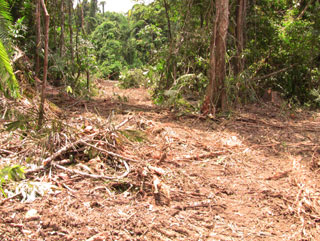A local organization in Papua New Guinea, known as Asples Madang, is fighting against one of the region’s biggest industrial loggers, Rimbunan Hijau (RH) chaired by billionaire Tiong Hiew King. Aspeles Madang has accused Malaysian company, RH, of acquiring land illegally and of using brute force and bribery in its dealing with locals.
A lawsuit by a local landowner claiming that the Forest Management Area was illegally granted to RH has put the company’s logging on hold for two months along the Ramu River in Madang Province. However according to Ecological Internet, which has started a campaign to expel RH from the area, the lawsuit is “only a temporarily reprieve”.
Ecological Internet working with Asples Madang, hopes to use the reprieve in order to bring attention to RH’s alleged abuses which it calls “sociopathic”, as well as highlight the possibilities of sustainable logging and alternatives to logging altogether in the region.
 RH logging site in Papua New Guinea. Photo courtesy of Ecological Internet. |
According to Ecological Internet RH has bribed local landowners, government officials, and police. The organization also reports on an incident where two teenage boys were shot by police allegedly paid off by RH after the boys broke into an RH tool shed.
This isn’t the first time that RH has faced allegations of corruption and environmental degradation. A report by Greenpeace of RH’s operations in Papua New Guinea found that the company conducted large-scale illegal logging in Papua New Guinea and had violated numerous human rights.
JK Balasubramaniam, RH company secretary, called Greenpeace’s allegations “baseless, frivilous, vexatious” saying that Greenpeace was committing “economic terrorism”.
However, a report by the Papua New Guinea Department of Labor and Employment also found evidence of bribery, corruption, and slave-like treatment of employees by RH.
The Ramu River Valley in Madang Province, Papua New Guinea is home to 2.47 million acres of lowland rainforest and swamp forest.
Rimbunan Hijau (RH) did not respond to request for comment.
Related articles
Palm oil developers in Papua New Guinea accused of deception in dealing with communities

(09/25/2009) Papua New Guinea, the independent eastern half of the world’s second largest island (New Guinea), houses one of the planet’s last frontier forests. These forests support a wealth of plants and animals as well as the Earth’s most diverse assemblage of cultures—some 830 languages are spoken in Papua New Guinea (PNG), representing more than 12 percent of the world’s 6,900. But PNG’s forests are fast-changing. Between 1972 and 2002 PNG lost more than 5 million hectares of forest, trailing only Brazil and Indonesia among tropical countries. Forest loss has been primarily a consequence of industrial logging and subsistence agriculture, but large-scale agroindustry—especially development of oil palm plantations—has emerged as an important new driver of land use change. Dozens of international companies have set up operations in the country over the past decade, including Cargill, an agribusiness giant based in Minneapolis. While Cargill says it is committed to sustainable and responsible palm oil production across its three plantations in PNG, the firm has been targeted by local and international NGOs, which claim it has polluted rivers and deceived local communities into signing agreements they do not understand. Some landowners say they are receiving few of the benefits oil palm promised to deliver, while losing their independence—they are now reliant on an export-oriented crop they can’t eat. Opposition to further oil palm expansion is now growing, especially in Oro Provice, where Cargill’s plantations are based.
Mixed signals from the crown? Queen knights logging tycoon while Prince fights deforestation
(06/22/2009) Tiong Hiew King, founder and chairman of the Rimbunan Hijau Group, a Malaysian logging firm notorious for large-scale destruction of rainforests, has been knighted by Queen Elizabeth, a move which environmentalists say directly conflicts with her son’s campaign — the Prince’s Rainforests Project — to save global rainforests. Prince Charles established the project in 2007 and has become increasingly vocal in his calls to conserve forests.
24% of Papua New Guinea’s rainforest destroyed or degraded by logging in 30 years

(02/23/2009) Nearly one quarter of Papua New Guinea’s rainforests were damaged or destroyed between 1972 and 2002, report researchers writing in the journal Biotopica. The results, which were published in a report last June, show that Papua New Guinea is losing forests at a much faster rate than previously believed. Over the 30-year study period 15 percent of Papua New Guinea’s tropical forests were cleared and 8.8 percent were degraded through logging.
Loggers, palm oil firms eye remote rainforests of Papua for development
(07/25/2008) Commodity producers are eyeing one of the world’s last relatively untouched tracts of rainforest for development, reports the Wall Street Journal.
Papua New Guinea’s rainforests disappearing faster than thought
(06/02/2008) Logging is taking a heavy toll on the forests of Papua New Guinea, suggests a new study. Using satellite images to reveal changes in forest cover between 1972 and 2002, researchers from the University of Papua New Guinea and the Australian National University found that Papua New Guinea (PNG) lost more than 5 million hectares of forest over the past three decades — total forest cover declined from 38 million hectares in 1972 to 33 million hectares in 2002. Worse, deforestation rates may be accelerating, with the pace of forest clearing reaching 362,000 hectares (895,000 acres) per year in 2001. The study warns that at current rates 53 percent of the country’s forests could be lost or seriously degraded by 2021.
Papua New Guinea to ban log exports by 2010
(03/17/2008) Papua New Guinea (PNG) will phase out log exports by 2010 said Forest Minister Belden Namah last month. The move comes as the country seeks to gain greater control over illegal logging and promote expansion of oil palm cultivation.
Papua New Guinea’s Environment Minister says foreign firms attempted to bribe him
(02/04/2008) The Environment and conservation minister of Papua New Guinea, Benny Allen, has stated that three different foreign firms attempted to bribe him.
Home Depot, Lowe’s selling illegal wood from Papua New Guinea-Report
(03/23/2006) Consumers in the United States are being mislead as to the origin of merbau hardwood flooring being sold by Home Depot and Lowe’s. According to a new report published by the Environmental Investigation Agency and their Indonesian NGO partner Telepak, such timber is coming from the forests of Indonesia’s remote Papua Province, where 80 percent of logging is estimated to be illegal.